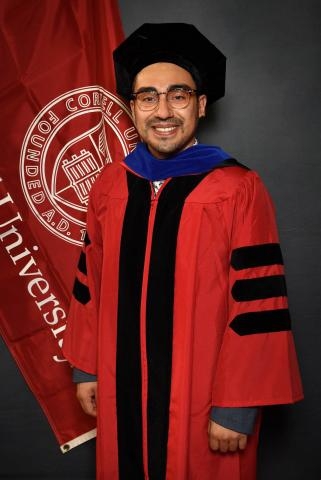Oncogenic PI3K Signaling Impacts Adaptive Immune Resistance by Upregulating Extracellular Vesicle Biogenesis and PD-L1 Associated Cargo
Student Name:
Julio Sanchez
Student Concentration:
Molecular and Cellular Medicine
Principal Investigator:
Richard Cerione
Degree Conferral Date:
December 2022
Committee Member 1:
Robert Weiss
Committee Member 2:
Gunther Hollopeter
Committee Member 3:
Maurine Linder
Abstract:
Phosphatase and Tensin Homologue Deleted in Chromosome Ten (PTEN) is one of the most frequently lost tumor suppressors in cancer and the predominant negative regulator of the PI3K/AKT signaling axis. A growing body of evidence has highlighted loss of PTEN with immuno-modulatory functions including the upregulation of the protein death ligand-1 (PD-L1), the development of an immunosuppressive tumor immune microenvironment (TIME), and more recently, a biomarker for patients likely to be non-responders for immune checkpoint inhibitor (ICI) therapy. It is postulated that loss of PTEN leads to an altered secretome in cancer cells, however no studies have investigated the relationship between PTEN loss and extracellular vesicles (EVs). EVs are important modulators of the TME, contributing to immunosuppression, tumor growth, vascularization, and metastasis. Because anti-tumor immune responses are often associated with elevated levels of the inflammatory cytokine interferon-γ (IFN-γ), we sought to investigate whether PTEN loss and/or IFN-γ signaling could independently and/or mutually impact EV biogenesis, PD-L1 cargo and immune evasion. Using several isogenic glioma cell lines for PTEN expression in combination with pharmacological inhibitors, we present evidence that suggests PTEN loss and/or elevated PI3K activity with an increased rate in EV biogenesis. Additionally, although we observed no impact in EV biogenesis in response to IFN-γ treatment, its capacity to upregulate PD-L1 at both the cell surface and EVs was significantly thwarted in cells expressing PTEN compared to their non-expressing counterparts. Using an in vitro T cell receptor (TCR) reporter cell line, we demonstrate that EVs derived from cells without PTEN have a greater ability to suppress TCR signaling in response to IFN-γ. These results highlight a new role for PTEN loss in regulating EV biogenesis and cargo sorting and adds new insights into how oncogenic signaling patterns can facilitate adaptive immune resistance in response to IFN-γ.
Publications:
New insights into extracellular vesicle biogenesis and function. Latifkar A, Hur YH, Sanchez JC, Cerione RA, Antonyak MA. J Cell Sci. 2019 Jul 1;132(13):jcs222406. doi: 10.1242/jcs.222406. PMID: 31263077



